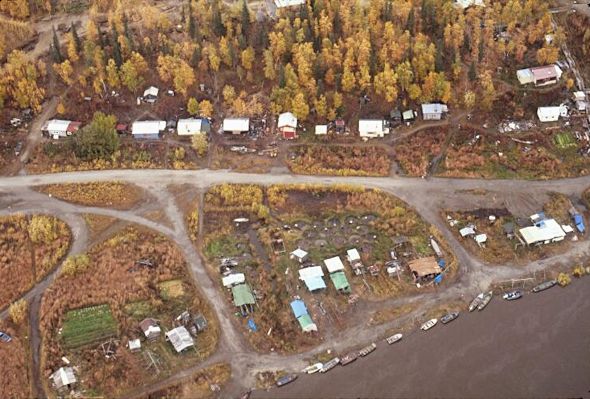The Native Village of Shungnak is a traditional Iñupiat Eskimo village located on the winding shoreline of the Kobuk River about 150 miles east of Kotzebue, and about 10 miles downstream from the village of Kobuk. 
Official Tribal Name: Native Village of Shungnak
Address:
Phone:
Fax:
Email:
Official Website:
Recognition Status: Federally Recognized
US Culture Region: Artic
Alaskan Ethnic Group: Eskimo
Alaskan Native Culture: Iñupiat Eskimo
Alaska Geographical Region:
Alaska Borough / Census Area:
Alaska Native Regional Corporation: NANA Regional Corporation
Alaska Native Association:
Tribal Council: Agency:
Related Tribes:
Language:
Traditional Name / Traditional Meaning: This name is derived from the Eskimo word Issingak, which means jade, a stone found extensively throughout the surrounding hills.
Alternate Names / Spellings: Kobuk, Kochuk
Location:
The Native Village of Shungnak is a traditional Inupiat Eskimo village located on the winding shoreline of the Kobuk River about 150 miles east of Kotzebue, and about 10 miles downstream from the village of Kobuk.
Village History:
Founded in 1899 as a supply point for mining activities in the Cosmos Hills, this Iñupiat Eskimo village was forced to move in the 1920s because of river erosion and flooding. The old site, 10 miles upstream, was renamed Kobuk by those who remained there. The new village was named Kochuk but later changed to Shungnak. The People: Government: Climate and Topography:
Transportation Services and Facilities:
Shungnak is accessible by plane, barge or small boat in the summer, and by plane and snowmobile in the winter. The city’s airport has a lighted gravel runway that is 3,400′, and has scheduled air service from most of the air carriers in the region. Small boats, ATVs, snow machines, and dog sleds are used for local travel and subsistence activities. Old trails along the river are still used for inter-village travel.
Local Governmental Services:
Shungnak has a mayor/council form of government, employing a city manager, vice-mayor, clerk, treasurer, and police officer.
Other Services and Utilities:
Shungnak has two stores, a pool hall, three churches, a National Guard Armory, city office building, jail, post office, and a village clinic.
The Community Health Aide/Practitioner program (CHAP) operates eleven remote village clinics. Most clinics have a full time staff of two to four Health Aides who service about one-half of the total patient contacts.
All clinics are directly connected to the Maniilaq Health Center in Kotzebue, providing access to all medical records and medical libraries as well as visual and audio teleconferencing capability to consult doctors.
Using a computer telemedicine unit, village clinics can send electronic pictures to the Maniilaq Health Center, where physicians view the images, making long-distance diagnosis easier and more accurate.
Several times a year specialized doctors, dentists, and eye doctors make regularly scheduled visits to the clinics to provide specialized care not usually offered in the area. Additionally, Maniilaq Association contracts with a Licensed Air Carrier to provide reliable, safe and timely medevac services.
Schools: Media:
Employment / Economy:
Shungnak subsists mainly on fishing, hunting and trapping. The village economy is based on a subsistence lifestyle dependent primarily on sheefish, whitefish, caribou, moose, ducks and berries. Most full-time employment is with the school district, city, I.R.A. council, Maniilaq Association, two stores, and a lodge. The Bureau of Land Management (BLM) provides seasonal employment, usually hiring over 30 residents every year to fight fires. Shungnak also boasts a strong arts and crafts industry; residents sell finely crafted baskets, masks, mukluks, parkas, hats, and mittens.
Income / Poverty Level:
Housing:
Clans / Societies:
Tribal Flag:
Tribal Emblem:
Legends / Oral Stories:
People of Note:
In the News:
Further Reading:
